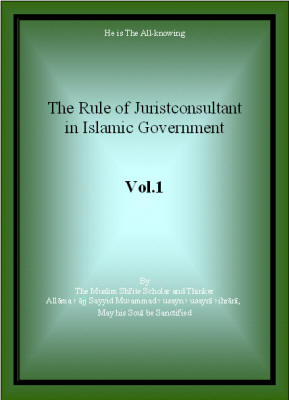
The center for decision making in Islam is exclusive to
the most knowledgeable and the most proximate people to God.
Subject of the Book : How Can an Islamic Government be Implemented?
■ Why should Islamic government be sought?
■ Where is the starting point for setting up an Islamic government?
■ What factors were originally involved in the revolution of Iranian people?
■ What is the Islamic constitution like?
■ Who is the leader in the Islamic government?
■ What is the duty of the authorities who object to the leadership’s thoughts and views?
This collection concerns the Rule of Juristconsultant (wilāyat-i faqīh) in the Islamic Government, presented after the publication of “The Duty of Individual Muslims in Reviving Islamic Government”, and compiled by two of the learned scholars in four volumes consisting of 48 lectures.
Excerpts from the book:
• A government [hukūma] is aimed at supplying people’s requirements; and people’s requirements are not merely material, they are to be guided toward spiritual attainment, too.
• He who has not abandoned his carnal desires and not attached to God can not guide people toward perfection.
• Without having specialized in God’s plans for people’s life, one can not guide human society.
• In an Islamic government, the most knowledgeable and Godly person is privileged to rule.
• Accessing such a person is not feasible through election.
• The learned and knowledgeable experts ought to identify and introduce the superior person from among themselves.
• The criterion for being the most learned in religion is being the most learned in comprehending the Qur’an.
• Managing the Society’s affairs requires inner light and heartfelt certitude besides expertise in comprehending the Qur’an.
• The scholars who are not qualified as per themes in the hadīth of Kumayl are the usurpers of the wilāyat position.
• Authorities of all forces are installed by the Muslim ruler, and are his deputies rather than parallel to him in authority.
• A ruler’s duty is to understand and implement God’s plans in society, rather than giving personal advice.
• A ruler’s prime duty is to develop the culture of prayer, alms tax, justice, commanding good and forbidding wrong and safeguarding people’s rights.
• ﴾lā ikrāha fī al-Dīn﴿ (there is no compulsion in Religion [2:256]) concerns beliefs rather than observance of public law in society.
Persian & Arabic full text